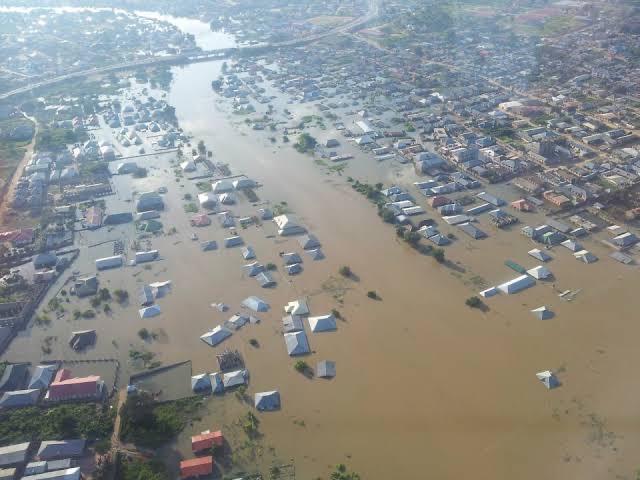
JUST IN: Nigeria Faces Imminent Flooding as Federal Government Issues Urgent Warning for 30 States

In an urgent advisory issued by the Federal Government of Nigeria, citizens have been warned of impending heavy rainfall and flooding that could affect at least 30 states across the country, including the Federal Capital Territory (FCT). The National Emergency Management Agency (NEMA) has raised an alarm about the potential for widespread flooding, with certain regions, particularly in the southern and coastal areas, being at a significantly higher risk of severe disruptions.
The warning comes amidst a growing concern over the unpredictable nature of weather patterns this year, which has left authorities on high alert. According to the meteorological data, the heavy rains, which are expected to intensify over the coming weeks, could lead to devastating floods, particularly in states such as Bayelsa, Delta, Edo, Rivers, Cross River, and Akwa Ibom. These areas have historically been prone to annual flooding, but experts say the magnitude of this year's predicted rainfall is unusual, with the possibility of unprecedented rainfall levels that could exceed previous records.
The Federal Government’s caution comes after detailed reports from Nigeria's meteorological agencies that have tracked seasonal rain patterns, showing that the wet season this year could be more severe than expected. Authorities have stressed that these rains could overwhelm drainage systems, cause rivers to overflow, and lead to life-threatening conditions for those living in vulnerable regions, particularly those along the coast and riverine areas.
In addition to the six states listed as being at high risk, NEMA has also identified a broader list of 30 states that are likely to experience varying degrees of flooding. Among these, communities in the central and northern regions are warned to expect heavy rainfall, while some areas in the southern belt, especially in the Niger Delta, will bear the brunt of the water overflow. The FCT is also included in the list of areas under threat, with authorities urging residents to take precautionary measures to mitigate the effects of the impending deluge.
The government has recommended that all citizens, particularly those living in flood-prone areas, begin to prepare for possible evacuations or temporary relocation. It has also urged local government councils to be proactive in clearing drainage channels to prevent blockages that could exacerbate flooding when the rains begin in earnest. The government has promised to release more specific guidance on evacuation procedures in the coming days, with particular focus on areas deemed most at risk.
Bayelsa, Delta, and Rivers states, which are home to a large portion of Nigeria’s oil production infrastructure, are particularly vulnerable to flood risks. Over the years, these states have witnessed severe flooding, disrupting livelihoods and damaging critical infrastructure. Many communities in these states are already accustomed to seasonal floods, but the scale of the upcoming rains could stretch the capacity of state and local emergency response teams. Experts have noted that residents of these regions should begin reinforcing their homes, securing important assets, and staying informed through official channels regarding evacuation plans.
The government’s cautionary message has sparked a flurry of discussions across social media platforms, with many Nigerians expressing concern over the preparedness of both state and federal agencies to handle such a catastrophic event. Some have pointed out that flooding in previous years has highlighted a chronic issue with poor urban planning, inadequate drainage systems, and insufficient government action to prevent the worst effects of these seasonal rains. This year, however, the federal government has promised to act more decisively, having learned from the mistakes of previous flood seasons.
In addition to the devastating impact on homes and infrastructure, experts warn that the floods could also disrupt agricultural production, particularly in the country’s breadbasket regions, which are heavily dependent on seasonal rainfall. The loss of crops, livestock, and farmlands could exacerbate food insecurity in parts of the country, already under strain due to economic challenges. The government has indicated that it will be working closely with agricultural experts to provide relief and support to farmers in flood-impacted areas.
The forecasted floods also raise significant concerns for Nigeria’s vulnerable populations, including low-income families, the elderly, and people with disabilities. For many of these individuals, the risk of displacement and loss of life is particularly high during floods. In response, the government has asked humanitarian organizations to be ready to assist in providing emergency shelter, medical care, and food for those in need. A robust coordination plan has been put in place between the federal and state governments to ensure that relief efforts are as swift and efficient as possible.
As the days go by and the rains continue to approach, Nigeria’s emergency management teams are working overtime to ensure that disaster response systems are in place and ready to deal with what could potentially be one of the worst flood seasons in recent memory. Local communities have been encouraged to stay informed by following government updates, listening to weather reports, and taking personal safety measures, such as avoiding flood-prone areas, securing essential items, and preparing for any eventuality.
In the meantime, citizens have been urged to remain calm but vigilant, with the federal government emphasizing that while the situation may seem daunting, the country's agencies are working tirelessly to manage the crisis and protect lives and property. As Nigeria braces itself for what could be an unprecedented rainy season, it is clear that the government, emergency responders, and local communities must work together to weather the storm and mitigate the destructive consequences of the floods.
The heavy rainfall and floods could be a serious test for Nigeria’s infrastructure and disaster management systems. Whether the country is prepared to tackle the crisis head-on, or if it will once again be overwhelmed by the magnitude of the damage, remains to be seen. But with government agencies now on high alert, it is hoped that effective coordination and timely interventions will minimize the loss of life and property during what promises to be a challenging period for millions of Nigerians.


